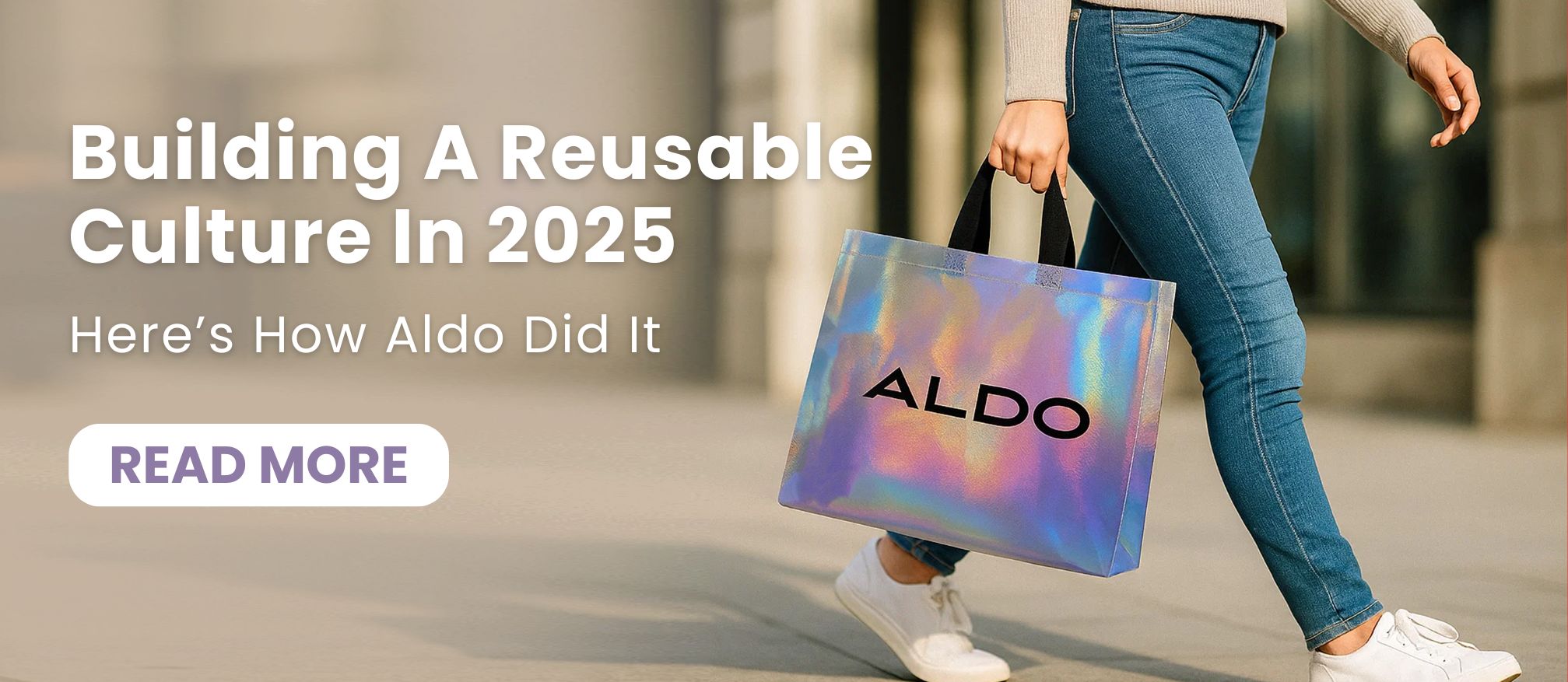The Problem
Retail has a packaging problem. Customers are no longer satisfied with single-use bags that get discarded within hours. They expect sustainability, but they also expect style. A bag that feels cheap or disposable reflects poorly on the brand, making it harder to win trust and loyalty.
For fashion brands, this challenge is sharper. Customers invest in products that express identity. They want packaging that reflects the same values — durable, premium, and reusable. For retailers, this isn’t only about perception — it ties directly into customer loyalty, compliance, and long-term costs.
The Shoe Industry’s Reality
The footwear industry moves millions of units each year. That means millions of bags leaving stores. For years, paper bags were seen as the “sustainable” answer. While recyclable, they are still single-use by nature. They tear easily, have a short lifespan, and often end up in waste streams before they can be recycled at all.
For retailers, this is a hidden cost: reordering stock more frequently, while offering customers packaging that rarely survives more than a single trip.
Shoppers are noticing. They want brands to go further — not just recyclable, but truly reusable.

Who Aldo Is
Aldo is one of the world’s most recognisable footwear and accessories brands. Founded in Montreal in 1972, they operate across more than 100 countries. Known for blending style with accessibility, Aldo has always focused on staying relevant to evolving customer expectations. Sustainability is now a key part of that journey.
Why Aldo Partnered With Us
When Aldo approached us, their goal was clear: evolve beyond single-use paper bags and create a program that reflected the values of their customers. They wanted a design people would be proud to reuse — whether on the street, at the office, or while shopping again.
For buyers, this approach demonstrates how packaging can shift from being a cost line to a marketing investment, driving both customer satisfaction and measurable brand visibility.

Bringing the Reusable Culture to Life
We worked closely with Aldo’s team to reimagine what a retail bag could be. Together, we developed a non-woven laminated bag with a glossy metallic finish, designed to fit two shoeboxes comfortably. The bag features black handles and a bold logo, combining strength with a sleek, fashion-forward look.
Our focus was on three essentials:
-
Sustainability — moving from single-use paper to certified reusable non-woven materials, reducing waste and extending bag life. This also supports sustainability metrics that retailers are increasingly required to report on.
-
Premium feel — the glossy laminated finish, reinforced structure, and polished black details made the bag feel more like an accessory than packaging. Customers are more likely to reuse items that feel too good to waste.
-
Reusability — the durable build allows each bag to deliver 50–150 uses, translating into thousands of impressions per customer across cities, offices, and homes.
The goal was simple but powerful: shift from a disposable item to a reusable asset that reinforced Aldo’s brand at every touchpoint.

Changing Customer Behaviour
Once the new bags launched, customers didn’t just take them home — they started reusing them in daily life. The glossy metallic finish and sleek black branding made the bag something people wanted to be seen carrying. Bags appeared in gyms, workplaces, and shopping streets. Each reuse turned into free, authentic advertising.
For buyers, this is where the impact becomes tangible. Instead of paying for one-off visibility through ads, the bag itself became a long-term marketing tool.
This shift proved that customers want to carry meaning, not just products. And when a bag is worth reusing, it keeps the brand alive long after the sale.
The Outcomes
The shift from paper to reusable laminated non-woven didn’t just change the bag — it changed customer behaviour and brand perception. Aldo gained a packaging solution that worked harder for the business, delivering long-term visibility, stronger loyalty, and measurable efficiency gains.
Key outcomes included:
-
Improved brand perception — customers associated Aldo with both sustainability and premium quality.
-
Increased loyalty — repeat use of the bags anchored Aldo in daily routines and encouraged return visits.
-
Expanded visibility — every bag delivered 50–150 reuses, creating thousands of impressions across cities, offices, and homes.
-
Operational efficiency — durable bags meant fewer reorders and direct alignment with ESG reporting goals.

Closing Thought
Paper bags might tick a sustainability box, but laminated non-woven bags with premium finishes build a culture. They last longer, travel further, and keep brands visible in ways single-use never can.
For retail buyers, the lesson is clear: packaging can no longer be treated as a disposable cost. Done right, it becomes a tool that improves compliance, strengthens loyalty, and pays for itself many times over.
Ready to start your project?
FAQs
1. How do reusable laminated non-woven bags compare to paper in cost?
While the unit price of laminated non-woven bags can be slightly higher than paper, their durability means fewer reorders and far greater brand visibility over time. Each bag delivers 50–150 uses, multiplying the return on investment.
2. Can the bags be customised to fit our brand’s design and sustainability goals?
Yes. We offer full customisation in size, colour, print, finish, and certifications to match your brand identity and ESG commitments.
3. What minimum order quantities (MOQs) do you require?
MOQs depend on the design and level of customisation, but our team works with retailers of all sizes to create scalable solutions that fit your needs.

